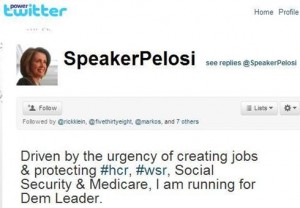A Politician’s Role in the Twitterverse: Popularity vs. Influence
It all began with a tweet from a college friend – and so began our Twitter discussion on the role politicians should play within the greater Twitterverse, and how they may view their own roles as part of the greater community.
Politicians are just like other tweeters, are they not? They use Twitter to share and disseminate information, while also striving to stay current and absorb additional news. Twitter is also a new way to hear from district and national constituents on specific issues that are being discussed. The real issue is that every politician approaches their use of Twitter differently, some don’t even utilize it at all.
 PART II – Popularity vs. Influence
PART II – Popularity vs. Influence
The number of followers one has on Twitter is often seen as a badge of honor, especially for an individual who isn’t necessarily a celebrity, to begin with. It means that people find that particular user’s tweets interesting and worthy of following and this increases the number of people they are able to reach and therefore influence. For TV & movie celebrities or politicians, much of their Twitter popularity isn’t as genuine. They often don’t need to go through a “worthiness litmus test“ and tend to generate a following based on their already large base of fans.
According to the Economist’s blog, a study was recently done by Social Computing Lab at Hewlett-Packard that analyzed twenty-two million tweets and developed an algorithm to determine if popularity and influence on Twitter are related to one another. They found it it was fairly easy to measure popularity by observing the number of followers per user, while they determined that influence was reflected by the number of tweets that had been shared or “retweeted.” Only 1 out of every 138 messages on Twitter that contain a link are actually “retweeted,” which shows the limited amount of tweets that are shared and users which garner influence.
They found that the most influential American politician on Twitter is not John McCain (who  has 1.7 million followers), but actually Nancy Pelosi (with only 15,964). This is due to the fact that Pelosi’s tweets are “retweeted” more and therefore more influential on the greater Twitter community. Even so, HP’s Social Computing Lab found rather good news for the Republicans: 70 of the 100 most influential members of Congress on Twitter are from the GOP. This means the Democrats have a lot of catching up to do.
has 1.7 million followers), but actually Nancy Pelosi (with only 15,964). This is due to the fact that Pelosi’s tweets are “retweeted” more and therefore more influential on the greater Twitter community. Even so, HP’s Social Computing Lab found rather good news for the Republicans: 70 of the 100 most influential members of Congress on Twitter are from the GOP. This means the Democrats have a lot of catching up to do.
Some politicians will use their Twitter accounts to tweet their daily schedules and feelings: “Happy to be here at . . .” or “Very POed at my colleagues who are not acting to pass the 9/11 Healthcare Bill. Our first-responders deserve better! #911actnow.” While it is great to show the public that you are working and involved in the community this alone isn’t going to necessarily have a real impact. A mix of good information, personal tweets, and community engagement is the ideal. A common mistake made by some politicians is to only post one style of tweet and not vary or include information that would likely be retweeted by followers. Take Congressman Ballentin’s (R-SC) latest post, one of 7 in the day: “after 1,000 pieces of Lego “˜construction’, I tend to get a little cranky.”
While the Congressman posts frequently, most of his posts are personal in nature ““ that being said he does engage the community by responding to his Twitter followers. It doesn’t matter how loud or how often you shout unless what it is you are putting out there is remembered and shared. Most importantly you need to understand your audience. So if a politician is only tweeting once a month, you want to make it count and ensure that you are posting information that is helpful, interesting, insightful or just funny. Ideally, a politician (or staffer) should be tweeting at least once or twice a day.
On a side note: The greater media is picking up stories from blogs and Twitter every day. This year, a staffer was found to have accidentally tweeted “U love torturing me w this shit” on Senator Chris Dodd’s Twitter account – causing a 5-minute media firestorm. Around the same time, former Boston Mayoral candidate, Michael Flaherty was assailed by the Boston Herald for having followed “@BostonEscorts” and “@BostonSexClub.” As was mentioned in the first segment of this series, “it shouldn’t take too much time to simply see if the follower is interesting enough or worthy of following back.” This was a case of a politician simply “friending” or following back every person who followed him, or a really idiotic staffer following anything and everything that had “Boston” in its Twitter username. Politicians are always in the watchful eye of the media, and in a 24/7 news cycle its important to double check anything and everything that is released under your name – even if its only 140 characters.
Next in this series of posts is “” “A Politician’s Role in the Twitterverse: Megaphone vs. Telephone”
This series of posts on “A Politician’s Role in the Twitterverse” was a joint collaboration between Sandi Fox, Smart As A Fox Consulting (@smartasafox) and Sean Hurley, Hear Forward (@seanphurley).
Comments are closed.